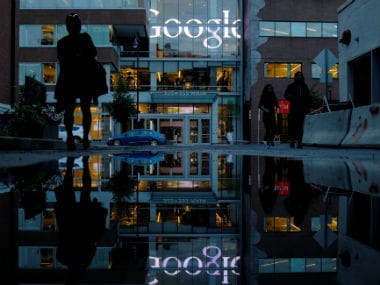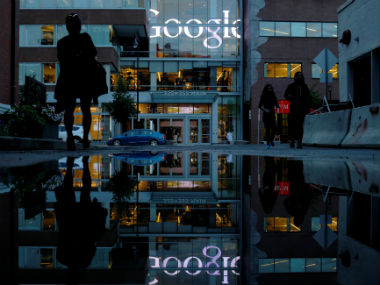Google funded think-tank, The New America Foundation, has parted with one of its scholars Barry Lynn for his criticism of Google’s increasing monopoly over the internet economy. [caption id=“attachment_3914431” align=“alignleft” width=“380”]
 Google. Reuters.[/caption] Barry Lynn, founder of the Open Market program in the New America Foundation, has been an active supporter of strict anti-trust regulations. In fact, in June, Open Markets Program had posted an
article appreciating the steps taken by the European Commission
against Google for abusing its
dominance
over the internet economy. An excerpt from the release said, “We call upon U.S. enforcers, including the Federal Trade Commission, the Department of Justice, and states attorneys general, to build upon this important precedent, both in respect to Google and to other dominant platform monopolists including Amazon.” Ironically, the tech giant was an investor in all researches done not only in Open Market, but also in the foundation which supported his program. Seeing growing
criticism from the foundation
, according to The New York Times, Annie-Marie Slaughter, president of The New America Foundation, was summoned by Eric Schmidt, the tech giant’s executive chairman. An email was sent from Slaughter to Lynn saying that the ‘time has come for Open Markets and New America to part ways’. Meanwhile, New America, in a
response post
to The New York Times report, said that the reasons for parting with the scholar was not related to the press release posted by Open Market, which dissed Google’s growing monopoly in the internet economy. The post also mentioned that the expelled scholar was removed due to lack of transparency from his side, which could have implications on the foundations funding. An official from Google,
in an email
to Ars Technica, stated, “We don’t agree with every group 100 percent of the time, and while we sometimes respectfully disagree, we respect each group’s independence, personnel decisions, and policy perspectives.” The scholar’s removal from the program is an example how research foundations have to maintain a fine balance when it comes to independent research and investor interest. On 27 June, EU antitrust
regulators hit Alphabet unit Google
with a record 2.42-billion-euro ($2.7 billion) fine indicating that they will likely take a tough line with the company in two other ongoing cases. The European Commission said that the world’s most popular internet search engine has 90 days to stop favoring its own shopping service or face a further penalty of up to five percent of Alphabet’s average daily global turnover. The Commission found that Google had systematically given prominent placement in searches to its own comparison shopping service and demoted those of rivals in search results.
Google. Reuters.[/caption] Barry Lynn, founder of the Open Market program in the New America Foundation, has been an active supporter of strict anti-trust regulations. In fact, in June, Open Markets Program had posted an
article appreciating the steps taken by the European Commission
against Google for abusing its
dominance
over the internet economy. An excerpt from the release said, “We call upon U.S. enforcers, including the Federal Trade Commission, the Department of Justice, and states attorneys general, to build upon this important precedent, both in respect to Google and to other dominant platform monopolists including Amazon.” Ironically, the tech giant was an investor in all researches done not only in Open Market, but also in the foundation which supported his program. Seeing growing
criticism from the foundation
, according to The New York Times, Annie-Marie Slaughter, president of The New America Foundation, was summoned by Eric Schmidt, the tech giant’s executive chairman. An email was sent from Slaughter to Lynn saying that the ‘time has come for Open Markets and New America to part ways’. Meanwhile, New America, in a
response post
to The New York Times report, said that the reasons for parting with the scholar was not related to the press release posted by Open Market, which dissed Google’s growing monopoly in the internet economy. The post also mentioned that the expelled scholar was removed due to lack of transparency from his side, which could have implications on the foundations funding. An official from Google,
in an email
to Ars Technica, stated, “We don’t agree with every group 100 percent of the time, and while we sometimes respectfully disagree, we respect each group’s independence, personnel decisions, and policy perspectives.” The scholar’s removal from the program is an example how research foundations have to maintain a fine balance when it comes to independent research and investor interest. On 27 June, EU antitrust
regulators hit Alphabet unit Google
with a record 2.42-billion-euro ($2.7 billion) fine indicating that they will likely take a tough line with the company in two other ongoing cases. The European Commission said that the world’s most popular internet search engine has 90 days to stop favoring its own shopping service or face a further penalty of up to five percent of Alphabet’s average daily global turnover. The Commission found that Google had systematically given prominent placement in searches to its own comparison shopping service and demoted those of rivals in search results.
Google funded think-tank removes research scholar for criticising Google's growing monopoly
tech2 News Staff
• September 2, 2017, 12:14:54 IST
Barry Lynn, founder of the Open Market program in the New America Foundation, has been an active supporter of strict anti-trust regulations.
Advertisement
)
End of Article